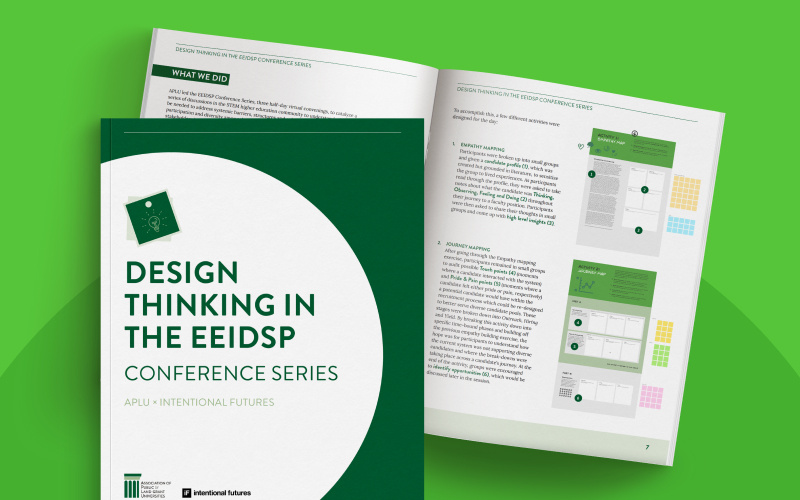Workshopping a community-built agenda to spark change and embed into hiring, evaluation and leadership practices
"With iF's help, we were able to facilitate productive sessions that captures the thoughts of the group and prepared us to take actionable steps toward the future." - Jessica Bennett, Director of STEM Education APLU
Overview
The Association of Public and Land-grant Universities (APLU) is an organization with a long and illustrious past-- established in 1887, the Association is a research, policy and advocacy organization dedicated to strengthening and advancing the work of public universities. With 244 public research universities across North America, the APLU’s influence is wide-reaching and respected.
In assessing the hiring practices and metrics across their membership of universities, the APLU concluded that despite the depth and breadth of data when it came to diversity in higher education faculty, adequate actionable steps were not being taken. They wanted to work with the STEM higher education community to think about new ways to promote diversity for faculty across universities, and called on iF to help facilitate the process.

What We Made
While APLU possessed the recommendations for making progressive change towards a more diverse faculty, nothing significant moved forward due in large part to a barriers-oriented way of thinking about the problem. Over the course of three virtual half day conferences and the spaces in between, iF and the APLU team worked towards generating new thinking around systemic change in a series of think tanks, making sure to center the experiences of underrepresented groups. Each workshop was facilitated using Mural boards the iF team designed with the intent to spark engagement and exchange of ideas.
Workshop 1: Hiring and recruitment process for faculty
The first session focused on envisioning the future with participants in small groups. Each group was assigned a Candidate Profile and filled in an Empathy Map accordingly, and then used those insights to walk through a Journey Map of a potential faculty member. Emphasis was placed on connection with individuals with different backgrounds, strengths and exercises, and how to value a wide range of experiences.
Workshop 2: Evaluation process for faculty
The team forayed into understanding racialized organizations with an end goal of addressing barriers created by them. Participants were split into groups based on the specific area of faculty evaluation they were interested in and tasked to fill in a Terrain Map and identify barriers created by such racialized organizations.
Workshop 3: Leadership approaches need to institutionalize new methods
This workshop encouraged participants to consider how cultural assumptions currently appear in their institutions, and what alternative futures could exist. From there, groups assessed their location in the greater ecosystem, and how other stakeholders could help progress towards that alternative future. The session wrapped with ample time for participants to think strategically about how to make the alternative future a reality.
After the workshops wrapped, we delivered a comprehensive synthesis report containing sections for "what we did", and "what we found" to guide future thinking.

Impact
With funding from the National Science Foundation (NSF), the series of workshops held by the APLU and designed by iF will hopefully inform a community-built agenda to catalyze change-- specifically, diversity in hiring practices in STEM higher education. Thinking in a way separate but not removed from the data was crucial for the stakeholders in the hiring process and design to feel invested in making change happen. Not only did the workshops provide a space for idea generation, it also fostered genuine connections amongst stakeholders by way of collaboration. As the APLU moves forward, they are prepared to support member institutions in improving their hiring, evaluation and leadership practices with an end goal of a more diverse faculty.
